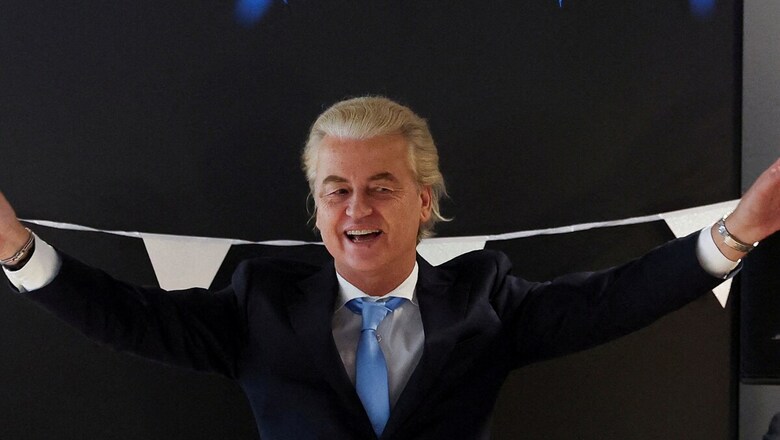
views
Anti-Islamism populist leader Geert Wilders has registered a shock victory in the Dutch general elections. News reports unanimously say that after 25 years in parliament, Wilders’ Freedom Party (PVV) is set to win 37 seats. This number puts Wilders well ahead of his nearest rival, a Left-wing alliance, but leaves him short of a majority.
A media outlet reported that the “PVV leader won after harnessing widespread frustration about migration, promising ‘borders closed’ and putting on hold his promise to ban the Koran.”
The dilution of Wilders’s position on banning the Koran, however, is less ideological and more tactical. It is aimed at boosting his acceptability among centre-right parties with whom he is hoping to forge a coalition government. As of now, the concession seems to have paid off. The more moderate on the Right are amenable to Wilders.
Wilders’s victory caps a recent, but what appears to be an inexorable, lurch towards the Far-Right in Europe. Indeed, many parties that were once described as “outcasts” are now in dominant positions in Italy, Spain, France, Hungary or Finland.
Naturally, the Left in Europe is besides itself with consternation. Even so, while the Left concedes that these parties are gaining acceptability, it also emphasises that they are very far from gaining respectability. At least not in the eyes of “cosmopolitan” voters who are dead against them.
Indeed, most parties like the PVV have taken very strident positions against multiculturalism. Some describe themselves as being against anti-Islamism. The phrase, of course, is interpreted by the opponents of parties like the PVV as denoting a brazen Islamophobia.
This is of course to miss the wood for the trees.
Though it must be admitted that the fine distinction between opposing Islamism and not Islam is easily lost. This happens especially when Far-Right politicians hit the stump and link the death of multi-culturalism in Europe to crude religion based reasoning.
But there are rare exceptions, like Suella Braverman. The now-sacked British Home Secretary has consistently managed to avoid sounding prejudiced.
Braverman, it is said, set out a nuanced “civic argument” against immigration by declaring: “Multiculturalism makes no demands of the incomer to integrate. It has failed because it allowed people to come to our society and live parallel lives in it. They could be in the society but not of the society.”
While Braverman may not have meant this explicitly about Muslims, empirical evidence suggests that this community of immigrants does have a problem shedding Islam’s innate exclusivism.
European Muslims often resist the secular bent of European constitutionalism that calls upon all citizens to embrace a common code of Western legal and cultural mores.
Clashes with authorities over the right to wear the burqa, or to occupy public spaces for daily prayers, renounce Shariat law or embrace scientific education in place of Madrassa learning is often read as a deliberate act of defiance to the nation-state ideology. It doesn’t help that European societies are overwhelmingly Christian. Being of the book, they are, therefore, less accommodative of imported dogma.
Wilders’s victory, therefore, should be heeded as a plea from the indigenous voters of The Netherlands to immigrants, especially Muslims, to conform. But what if the call were to go unheeded? Could the answer to that question seal the fate of Europe’s dalliance with multiculturalism?




















Comments
0 comment